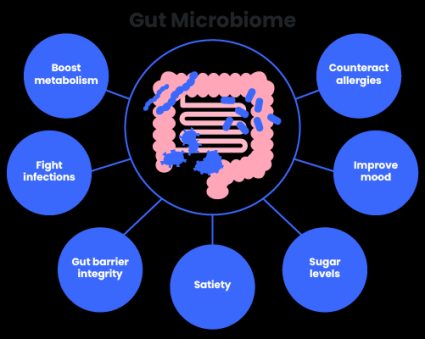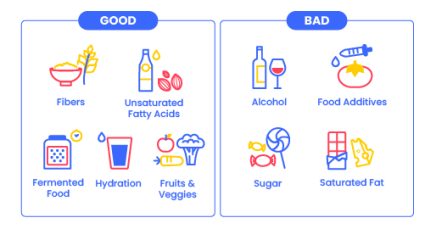Gut Microbiome Score Calculator
Ever wondered how your habits affect your gut health? Try our Gut Microbiome Score Calculator! It’s fun and easy to use. You’ll get personalized results that show what you’re doing great and where you can improve. Plus, learn all about the gut microbiome and why it’s so important for your health. Ready to boost your gut health? Let’s dive in!
We try our best to make our Omni Calculators as precise and reliable as possible. However, this tool can never replace a professional doctor's assessment. If any health condition bothers you, consult a physician.
Your gut microbiome — what is it?
Picture a bustling metropolis of tiny, hardworking residents right inside you — that's your gut microbiome! A vibrant community of microbes that call your gut home 🏡. They might be small, but they are not to be underestimated — the number of bacterial cells residing in our gut even exceeds the number of our own cells! Although we often associate 'bacteria' with illness, your gut bacteria are actually some of your greatest allies. They don't just keep things running smoothly in your digestive system; they're key players in overall health.
Think of your gut bacteria as a personal health squad: They help control your metabolism, determine how well you fight off infections, and even influence your risk of developing certain diseases, including cancer. Understanding the complex relationship between your gut and your health can be challenging, but we're here to break it down for you.

By getting to know your gut microbiome better and discovering how your daily habits shape your gut health with our easy-to-use calculator, you can make informed choices that promote a healthier, happier you. Let’s delve in and discover how you can build a harmonious relationship with your gut bacteria 🤗!

How your gut microbiome affects your health
Are you curious why everyone is talking about the gut microbiome and its impact on our health? Wondering how it's linked to almost everything? Let's find out if these claims are solid or just hype.
Our gut isn't just for digestion — it's a massive part of our immune system, packed with most of our immune cells. It helps us fight infections and manage allergies. Ever heard the term ‘second brain’? That's our gut! It constantly communicates with our actual brain, even producing neurotransmitters like dopamine and serotonin, which affect our mood and well-being.

💡 Did you know your gut has more neurons than your spinal cord?
The good bacteria in our gut actively defend us by:
- Occupying space: They block harmful germs by taking up space and using up nutrients.
- Creating an acidic environment: This wards off harmful pathogens.
- Producing antimicrobials: They make their own antibiotics and antimicrobial substances and boost our immune cells to do the same.
Bacteria in our gut also produce other vital substances called metabolites. These bacterial metabolites help:
- Regulate fat burning and sugar metabolism;
- Control inflammation; and
- Mature immune cells to be ready for action.
One key group of metabolites are short-chain fatty acids (SCFAs), as they:
- Power our healthy colon cells and selectively suppress cancerous cells;
- Regulate the activity of genes related to metabolism and immune function; and
- Control appetite.
But SCFAs aren't limited to the gut. They enter the bloodstream and travel to other organs, such as the pancreas, liver, fat tissue, and muscles, where they help regulate many vital processes.
In short, if we look after our gut microbes, they'll look after us. They play a vital role in keeping our metabolism, immune system, and overall health in check. So, it's worth paying attention to what keeps our gut microbiome healthy and appreciating these tiny warriors inside us — they're doing much more than we might think!
How gut imbalance leads to illness
Now that we know how amazing our gut microbes are, let's see what happens when things go south. When bad bacteria outnumber the good ones in our gut, more harmful substances are produced, and the protective gut barrier weakens, enabling harmful particles to enter the bloodstream. Bad bacteria have cell wall components like lipopolysaccharides that trigger inflammation by interacting with our immune cells. As they enter the bloodstream, they can cause trouble in various organs, resulting in a general low-grade chronic inflammation. This chronic inflammation can lead to serious health issues, such as:
- Heart disease;
- Type 2 diabetes;
- Cancer;
- Liver disease; and
- Neurological disorders.
Our organs and systems communicate with each other, so when the gut is inflamed, it releases signaling molecules (cytokines). They promote inflammation in distant organs and disrupt metabolic processes that can lead to, for example, insulin resistance. That means that when our gut microbiome is unbalanced (termed as gut dysbiosis), immune function and metabolism across multiple organs are disrupted, and we have less of our good bacteria that keep our immune system calm and properly fight infections.
Maintaining a healthy gut microbiome is essential to prevent common health issues, so start prioritizing gut health! 🦠❤️🩹
What shapes our gut microbiome?
Our gut microbiome is influenced by many factors, starting from the moment we're born👶. Let's break it down.
From birth, our gut microbiome is shaped by:
- Mode of birth: Natural delivery or C-section — natural birth is linked to a higher number of beneficial bacteria 📈
- Feeding type: Breastfeeding or formula — breastfeeding not only supplies the child with nutrients but also with active compounds that promote a healthy gut🤱🏽
- Illnesses and antibiotics: Early health issues and medications leave lasting impacts.
These early factors are crucial because the first bacteria to colonize our gut kickstart its development, training our immune system, aiding brain development, and influencing metabolism.
Luckily, we can shape our microbiota even in adult life. The factors impacting our gut health on a daily basis are:
- Diet 🍎: What we eat feeds not only us but our gut bacteria as well.
- Physical activity 🏋🏽♀️: Exercise produces lactate, which benefits our friendly bacteria.
- Sleep 🛌: Adequate sleep is vital for gut health.
- Drugs 💊: Long-term use, especially of antibiotics, can harm our gut microbiome.
- Stress 😰: Chronic stress negatively reshapes our gut bacteria.
- Smoking 🚬: Irritates the gut and decreases gut health.
- Hydration 💧: Dehydration impedes the growth of healthy gut microbiota.
- Alcohol 🍷: Induces inflammation and imbalances in the gut.
Takeaway: Fuel your gut with healthy foods, exercise, and plenty of water. Also, make sure to sleep well, skip smoking, watch your drinks, and use antibiotics wisely for a healthier gut and a happier you!
What to eat for a healthy gut
Even though we can't change our past, we can make positive changes now to support our gut health. Here's how you can nourish your beneficial gut bacteria:
- Fiber: Found in whole grains, legumes, fruits, vegetables, nuts, and seeds. These are the primary food sources for good bacteria.
- Unsaturated Fatty Acids: Especially omega-3s from olive oil, fish, avocado, nuts, and seeds. They help modulate your gut microbiome and have anti-inflammatory properties.
- Fruits and Veggies: Provide our good microbes with fiber and essential vitamins.
- Fermented Foods: Such as yogurt, kefir, sauerkraut, and kimchi. They contain natural probiotics (live health-promoting bacteria) and beneficial metabolites.
- Hydration: Drinking enough water is crucial for digestion and a healthy gut.
At the same time, you should minimize the intake of:
- Sugar: Reduces beneficial bacteria and has its own adverse health effects.
- Saturated Fats: Promote harmful bacteria growth.
- Food Additives: Preservatives, artificial sweeteners, and emulsifiers can disrupt your gut microbiome.
- Alcohol: Irritates the gut and causes imbalances.

Beyond diet — other factors
Now, it is somewhat obvious that the food we eat affects our gut, but what does exercise or sleep have to do with our microbes? Let’s take a look at how other habits influence the gut microbiome:
- Exercise: Helps improve digestion and supports gut health. Bacteria use lactate produced during exercise to create beneficial SCFAs.
- Sleep: Good sleep supports a healthy gut. Poor sleep increases cortisol, which disrupts the gut microbiome.
- Stress: Chronic stress raises cortisol, causing gut inflammation and a shift in bacterial activity.
- Antibiotics: Kill both harmful and beneficial bacteria. Use only when necessary.
- Nonsteroidal Anti-Inflammatory Drugs (NSAIDs): Routine use can negatively modify your gut microbiome.
- Smoking: Disrupts the gut barrier and negatively impacts gut health.
As you can see, a balanced diet, regular exercise, good sleep, and minimal stress are critical to a healthy gut microbiome. By making these positive lifestyle choices and avoiding negative factors as much as possible, you can support your gut health and overall well-being.
FAQs
Do probiotics help you lose weight?
There are several studies showing that particular probiotic strains can promote weight loss. This is due to the fact that beneficial bacteria in our gut regulate our metabolism and food hormones. However, the effects of probiotics are slight and do not show an impact on every individual. Much of it depends on your genetics, individual gut microbiome, and the habits you have to support gut health and weight loss.
What are short-chain fatty acids?
Short-chain fatty acids are metabolites that gut bacteria produce from dietary fiber. They have many essential functions for our body, such as providing energy to our gut cells and regulating our metabolism and immune system. They also possess anticancer and anti-inflammatory properties.
How can I improve gut health?
Maintaining a healthy gut involves a balanced diet, sufficient sleep, regular exercise, and effective stress management. Aim for a diet rich in fiber, fruits, vegetables, fermented foods, and omega-3 fatty acids. Reduce intake of sugar, animal fats, and processed foods. Stay hydrated, and limit smoking, alcohol, antibiotics, and drugs like ibuprofen and aspirin. Probiotic supplements can also support gut health.
How can I starve bad gut bacteria?
The best way to starve bad gut bacteria is to deprive them of their nutrients and support good gut bacteria. Bad gut bacteria thrive on refined carbs, sugars, and animal fat. A diet rich in fiber, omega-3s, fruits, vegetables, and fermented foods supports the growth of beneficial gut bacteria, which produce substances that kill harmful bacteria.
What is the microbiome?
The microbiome refers to the community of resident microorganisms in a specific location of the body, such as the gut or the skin. The types of bacteria residing in different body sites are influenced by their specific growth requirements and contribute to various functions that impact our health. Microbiomes throughout our body play roles in regulating local and systemic metabolism and immune system functions.